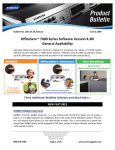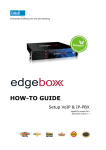Download Unified Communicator – User Guide
Transcript
Unified Communicator – User Guide Version 2.4 Contents Introduction ............................................................................................................................................ 3 Welcome to Unified Communicator ..................................................................................................... 3 Apple Basics/Glossary .......................................................................................................................... 3 Getting Started - Installation & Configuration .......................................................................................... 4 Pre-requisites & Server Configuration .................................................................................................. 4 ucplus Server Configuration ................................................................................................................. 4 Provisioning ......................................................................................................................................... 4 Client Installation................................................................................................................................. 4 Client Configuration............................................................................................................................. 4 Welcome Screen & Server Configuration Menu .............................................................................. 5 Dial Through settings ...................................................................................................................... 6 A Quick Tour ....................................................................................................................................... 7 Presence Icons ................................................................................................................................ 7 Presence Screen .............................................................................................................................. 7 Making Calls ........................................................................................................................................ 8 Make calls from Unified Communicator .......................................................................................... 8 Using Dial Through dialing .............................................................................................................. 9 Using Dial Direct (DDI/DID) dialing .................................................................................................. 9 Receiving Calls .................................................................................................................................... 9 Availability Status .................................................................................................................................. 10 Using Deskphone Mode ......................................................................................................................... 10 Searching the Address Book .................................................................................................................. 12 Using the Call History ............................................................................................................................ 12 Features Connectivity Requirements ..................................................................................................... 13 Feature Configuration Dependencies..................................................................................................... 13 _____________________________________________________________________________________ ucplus – http://plus-software.com/ Page 2 Introduction Welcome to Unified Communicator Unified Communicator is an application for Apple mobile devices that extends the power of your office telephone system to your mobile device. Apple Basics/Glossary New to iOS or UC? Here are a few of the basic operations and features explained. Tap Hold Touch the mobile device’s screen Touch the mobile device’s in the area of interest for a screen briefly in the area of second or two until the expected interest. action occurs. Drag While touching the mobile device’s screen, move your finger in the direction you want the screen or icon to scroll or move. Home Button Double Press - Pressing the home button twice will bring up the multitasking bar where you can access apps and settings; it provides another option to re-open Unified Communicator if it runs in the background. App Store This is from where you can download the Unified Communicator onto your mobile device. It can be accessed via a web browser or through the app which is usually already installed by default on your iOS mobile device. Mobex (Mobile Extension) This is the term used where a user has a virtual extension number which, when dialed, rings the user’s mobile phone. It is often grouped (or twinned) with a standard deskphone such that when the deskphone rings the mobile phone also rings. This functionality can often be configured in different ways and the features described in this document may have a dependency on this configuration. In some instances the deskphone extension is also the virtual extension. Extensions ucplus can display a complete list of extensions that you can choose to contact a specific Extensions are the telephone lines and physical devices that calls are made and received on; they tend not to move and are represented in ucplus by circle icons that look like these . _____________________________________________________________________________________ ucplus – http://plus-software.com/ Page 3 Getting Started - Installation & Configuration Pre-requisites & Server Configuration ucplus Server Configuration Please refer to the ucplus Server Installation Guide for prerequisites and setup information relating to Unified Communicator. Compatible iOS Versions: iOS 5.0 or later (note: iPad 1 is not supported). Note: Unified Communicator requires ucplus server 2.3.15 or later. Provisioning Unified Communicator user configurations can be pre-configured on the server so that the end user need only enter the IP address of the ucplus server after installing the app on the phone. The server recognizes the user’s mobile device and automatically provisions user parameters. Note: manual set up is also available – see ucplus Server Installation Guide for more details. GSM Unified Communicator uses the dialer presented by the iOS (normally a GSM dialer) on your mobile device to make and receive calls – it does not install an IP phone. Client Installation Unified Communicator can be downloaded from the App Store. The easiest way to find it is to search for “Unified Communicator”. Installation from here on is simple; just click on Free App -> Install App, you will then be asked to enter your Apple ID and password. Once the credentials have been accepted, UC app will be automatically downloaded and installed on your mobile device. Client Configuration Before you can get started making calls with Unified Communicator, you need to configure the client, so launch the app by tapping the shortcut that has been placed in your iPhone® Applications menu. _____________________________________________________________________________________ ucplus – http://plus-software.com/ Page 4 Welcome Screen & Server Configuration Menu When Unified Communicator opens for the first time, you will be presented with the Welcome screen. Tap the text box, then enter your ucplus Server’s IP address (note: if your administrator has given you a TCP port number then you should add you this to the IP address separated by a colon (:) e.g. 192.155.123.1:12345). Tap the Next button once the details are entered and then Unified Communicator will check to see if your system administrator has preconfigured your settings. If they have preconfigured your settings, the UC app should successful connect to the server and take you straight to your client menu, (you can skip the rest of this section too). If your settings have not been preconfigured, you will see a screen giving you two options. Tapping Refresh will cause Unified Communicator to check again for your preconfigured settings; use this if you have contacted your system administrator asking them to setup your settings. To configure Unified Communicator yourself, tap Manual setup to open the Settings menu. In the Settings menu you can access the first group of settings we need to configure. Tap on the options in the Connection section to enter the following details: Server address: The details you entered on the Welcome screen should already be in place here. If not, enter the IP address of your ucplus server. To use a specific port number, append it to the IP address using a colon e.g. 192.0.2.1:12345. You must append TCP port 21051 (default), or the port number provided by your administrator, to the public IP address as explained above. Deskphone extension: Enter the extension number that represents your deskphone on the phone system. This may be the same as your mobile extension. Mobile extension: Enter the extension number that represents your mobile device on the phone system. This may be the same as your deskphone extension but is more often a different virtual extension number. This can be left blank if the device is only used in deskphone mode. Tap on the options in the Login section to enter the following details Username: Enter the username given to you by your administrator. This should match the username which is set up in your ucplus Server user settings. Password: The password you need to enter here is your ucplus Server User password that is set in your User record in ucplus Server. _____________________________________________________________________________________ ucplus – http://plus-software.com/ Page 5 Click on your device’s “Done” button to save your settings and return to the main menu. At this point Unified Communicator is configured to connect to and communicate with ucplus Server but you also need to configure the Dial Through settings to make full use of Unified Communicator. Preconfigured Settings If your mobile client settings have been preconfigured by your System Administrator then the login options will be greyed out and unavailable for editing. Switch to another Server To change the server your mobile device is registered with, click on the option which displays your current ucplus Server’s IP Address, replace it for the new ucplus Server IP Address. If your mobile client settings have been previously pre-configured on the new server then your client will automatically refresh the login and configuration settings and connect to the new server. If however, your device hasn’t been previously preconfigured you will have to follow the steps mentioned in the Welcome Screen & Server Configuration Menu section for the manual configuration. Dial Through settings Unified Communicator can use the Dial Through (also known as Direct Inward System Access – DISA) or Auto Attendant configuration capability of the telephone system to allow the UC user dial extension numbers or any external numbers from their mobile phones via their office telephone system. Always Dial Through: When dialing an external number, the mobile phone user can decide whether to dial an external number directly through GSM or via the office telephone system. The preferred method of dialing out is controlled by toggle button (slide your finger across the slider button to turn it ON or OFF). Tap on each option in the Dial Through Settings section and enter the following details: Dial Through number: Enter the pilot number for your DISA / Auto-attendant system. Enter the entire DDI/DID number to dial; entering only the last half of the DDI/DID number will not work. Pause character: Enter the character used by your telephone system to indicate a pause e.g., (a comma). Trunk access: Enter the code used by your telephone system’s Dial Through to access an outside line e.g. 9 is common. _____________________________________________________________________________________ ucplus – http://plus-software.com/ Page 6 External number length: Enter the number of digits an external telephone number would be expected to have i.e. a telephone number with fewer digits than the value entered here will be considered an internal number by Unified Communicator. Fast Dial: Enabling Fast Dial will significantly reduce the connection times that are normally associated with Dial Through dialing; this feature requires Wi-Fi/3G or better (slide your finger across the toggle button to turn it ON or OFF). Click your device’s “Done” button to save your settings and go back to the previous menu. At this point Unified Communicator is configured to connect to and communicate with ucplus Server as well as make and receive Dial Through calls. A Quick Tour Presence Icons The Presence icons indicate the call status and availability of you and your co-workers. No call Ringing Call in progress Call on hold Offline Do not disturb Meeting Out of office Presence Screen The Presence screen displays the list of extensions that has been downloaded from the telephone server. The list can be split into departments as they are stored on ucplus Server. Groups can be expanded and contracted by simply tapping on them. You can create a group of Favorites by holding and tapping on the user and selecting ‘Add to favorites’. If the user already exists in the group you can always remove it by holding and tapping on the ‘Remove from favorites’ option. Favorites group will always be displayed at the top of the Presence Screen. (Adding or removing users from the Favorites does not affect the content of the other groups). _____________________________________________________________________________________ ucplus – http://plus-software.com/ Page 7 Directory Screen You can search the ucplus shared directory on your mobile device from this screen. Type in your search terms, tap the Search button ( ) and tap to dial the number. Call History Screen This screen lists the calls received with Unified Communicator by the user. Tapping on any of the entries gives you the call options. Note: this feature requires WiFi/3G data connection or better. See section using the Call History chapter for full details. Making Calls Make calls from Unified Communicator If you see a number in the Address Book or on the Presence Screen that you would like to call, just tap on it and the Actions menu will provide you with two options; 1. Call the number using Dial Through (Dial Through must be set-up, see Dial Trough settings above) or 2. Call using Dial Direct option (assuming that DDI/DID for the extension has been preconfigured on the ucplus Server). Tap on one of the preferred dialing methods and the call will be made. Note: Calls to internal numbers automatically goes using Dial Through. _____________________________________________________________________________________ ucplus – http://plus-software.com/ Page 8 Using Dial Through dialing Dial Through uses DISA or Auto-Attendant capability of the office telephone system to route calls from your mobile device through the telephone system. To setup Dial Through, go to Dial Through Settings, enter the phone number specified by your office telephone system administrator and turn on the Always Dial Through option. Once this is setup, the Unified Communicator mobile client will route calls through your office telephone system. Please note that Unified Communicator will automatically recognize numbers of a certain length as internal numbers and will use the Dial Through option regardless of the Always Dial Through setting (Assuming DISA or Auto-Attendant is set up the extension number dialed does not require a DID/DDI number to be associated with it). Dependent upon the system configuration, Fast Dial can increase the speed of the connection time when using Dial Through. Using Dial Direct (DDI/DID) dialing If a DDI/DID number is associated with an extension, you can also dial the DDI/DID number directly by pressing Dial Direct (DDI/DID) instead of Dial Through. This option requires the DDI/DID number to be preconfigured against the extension on the ucplus Server. For more information please contact your office Telephone System administrator. Receiving Calls When correctly licensed and configured, a office telephone system can be set up to call both a user’s extension number and mobile phone simultaneously. This is known as twinning or mobile extension (Mobex for short). Sometimes it isn’t going to be appropriate for incoming calls to your office-based extension to be passed on to your mobile device e.g. You might be at your desk right next to your office extension so passing the call to your mobile device would be a little pointless. At times like this, you can block incoming calls from being passed on to your mobile device or you can reroute those calls to another extension or to an entirely different number. The Availability settings can be found by pressing your own Extension on the main menu. To block the incoming call, turn on the Do Not Disturb option which can be found also on the Availability screen. _____________________________________________________________________________________ ucplus – http://plus-software.com/ Page 9 Availability Status By tapping on extension (e.g. 2323 Mike Jefferson) you will be presented with the Availability screen where you can configure your individual settings: Do Not Disturb (slide your finger across the toggle button to turn it ON or OFF). Forward Calls (slide your finger across the toggle button to turn it ON or OFF – if this is the first time you use this option you will have to provide Destination phone number to whom you would like to forward your calls). Status allows you to change your current availability to Available, Busy or Out of the Office. Also the Absence message option allows you to provide more information to your colleagues at work. Using Deskphone Mode Sometimes it would be really useful if your deskphone had a dedicated touchscreen that not only controlled your deskphone but linked to your contact information as well so that you could look up contacts and dial them with a single tap. Well, putting Unified Communicator into Deskphone mode enables it to control an adjacent device e.g. your deskphone. So it is like your mobile device has been turned into a detached touchscreen for your deskphone that can access the shared ucplus directory and pass data from it to your deskphone. What this means is that you won’t actually be making Dial Through calls through your mobile device but using your device to select which number to call on your deskphone. For example, you could use Unified Communicator on your mobile phone to search for contacts but use your deskphone to actually make the call i.e. use the convenience of the mobile device to search for a number and the tariff rate of the deskphone. Deskphone mode will force any call made from Unified Communicator to call from your deskphone. Also, with tablet devices replacing PCs for many day-to-day tasks in many office workplaces around the world, running unified communicator in Deskphone mode on your tablet allows you to make calls from your deskphone in the same way you would use ucplus Client on your PC (bringing all the advantages of click to dial to your tablet device). _____________________________________________________________________________________ ucplus – http://plus-software.com/ Page 10 Of course, calls to your mobile number will still come through as normal and all of the other functions and features of your mobile device will continue to work alongside deskphone mode. When you are in deskphone mode, the app looks the same as when it’s not in deskphone mode. The screens in Unified communicator all still work in the same way too so, when you tap on a Directory search result, a call is placed to that contact but it is made directly on your deskphone rather than through your mobile device. Enabling or Switching between Deskphone Mode and Mobile Mode by clicking the phone/house icon (shown below) located at the top of the main window and selecting the mode you require from the menu. As a mode of example you can see below the extensions associated to Mike Jefferson: Settings Screen This screen allows you to setup your Server IP Address with your mobile extension and login credentials as well as preferences for your Presence Screen display like “Enhanced Presence”, group extensions by Departments by simply sliding the “ON or OFF” button or sort the extensions either by Name or Number. Unified Communicator detects the Language of the iOS on your iPhone® if however, your language preferences differs from those set by the UC app you can easily change them by selecting the pereferred language from the ‘Language” list. The option “Clear Settings” will delete the current client configuration , please consult with your administrator before chosing this option. _____________________________________________________________________________________ ucplus – http://plus-software.com/ Page 11 Searching the Address Book Just because you are out of the office doesn’t mean you are out of touch with all of your office contacts anymore. Unified Communicator’s Address Book is not just the same as your office-based shared Address Book – it is your office-based shared ucplus Address Book. So when you enter all or part of a name or number into the search box and tap the Search button, Unified Communicator remotely searches the ucplus Address Book back in the office and delivers the search results direct to your mobile device. To call any of the numbers listed in the search results, simply tap on them. If there are more results than can fit on the screen simultaneously, drag the screen up to see more results. Using the Call History The Call History is your mobile device’s log except that it only shows the call activity made through Unified Communicator so it is ideal for times when you need a more narrow list of call activity than the log on your device. Callers with records in your shared ucplus directory are clearly identified by their name and you can see which direction the call was made in i.e. incoming or outgoing; the red arrow indicates incoming and the blue arrow indicates outgoing. To call any of the listed numbers, just tap on one. Scroll through the list by dragging the screen up if there are too many calls to see onscreen simultaneously. Note: this feature requires a Wi-Fi/3G data connection or better. _____________________________________________________________________________________ ucplus – http://plus-software.com/ Page 12 Features Connectivity Requirements Features Requirements Extensions (Presence) Searching shared Address Book Call History Fast Dial Wi-Fi/3G data connection or better Wi-Fi/3G data connection or better Wi-Fi/3G data connection or better Wi-Fi/3G data connection or better Warning: Your mobile provider may charge you for data services used from your mobile device Feature Configuration Dependencies The availability of certain features is dependent upon the configuration of the office telephone system. These include: Feature Block incoming calls Reroute incoming calls Deskphone mode Dial Through Warning: Enabling the telephone system for these features may require additional licenses to be installed on the office telephone system for more details. _____________________________________________________________________________________ ucplus – http://plus-software.com/ Page 13













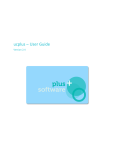
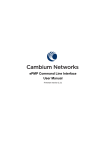
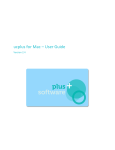
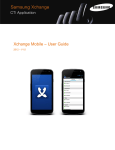
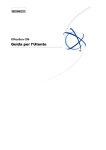

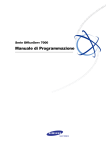
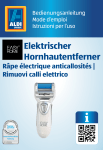
![SamsungProdBulletin_211_4_4x_Software_Release[1]](http://vs1.manualzilla.com/store/data/005825179_1-598976db56b1ef1012f4b9b7fb2b917f-150x150.png)
